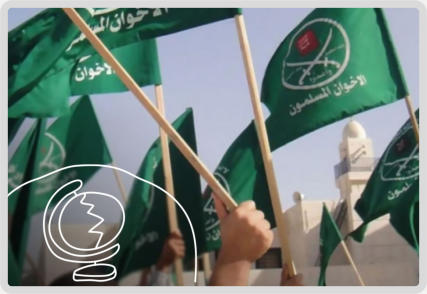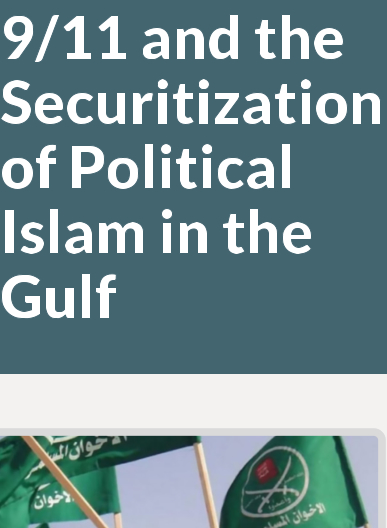

© 2023-2024 Oriental Institute, The Czech Academy of Sciences, Kevin L. Schwartz, and Ameem Lutfi


After
it
was
revealed
that
seventeen
of
the
nineteen
9/11
hijackers
hailed
from
the
Gulf
(fifteen
were
Saudi
citizens,
two
were
Emiratis),
the
states
of
the
Gulf
Cooperation
Council
(GCC)
doubled
down
on
rhetoric
about
the
need
to
combat
radical
and
militant
Islam.
Washington
also
added
pressure
on
the
GCC
states
to
reform
their
political
and
educational
systems,
as
considerable
blame
was
placed
on
the
environments
of
these
countries,
particularly
Saudi
Arabia,
for
fostering
the
ideology
of
Osama
bin
Laden
and
al-Qaeda.
Fatima
al-Sayegh
points
out
how
the
U.S.
highlighted
a
lack
of
what
it
considered
tolerance
in
these
states,
which
has
arguably
spurred
actions
like
the
c
reation
of a Ministry of Tolerance
in the UAE in 2016.
1
Reforms
to
educational
systems,
in
particular,
involved
changes
to
religious
curricula,
which
had
long
been
influenced
by
Muslim
Brotherhood
figures
who
arrived
in
the
Gulf
in
the
1950s
to
staff
nascent
educational
systems.
It
was
during
this
period
that
any
form
of
political
Islam
came
to
be
linked
to
jihadism
and,
by
extension,
al-Qaeda,
spurring
overzealous
policing
of
some
religious
groups.
For
instance,
in
the
UAE,
some
250
people
were
arrested
following
9/11
on
terrorism
charges,
most
of
whom
were
released
by
2004.
2
Also
after
9/11,
the
Emirati
government
redoubled efforts to convince its local Muslim Brotherhood branch to disband.
3
9/11
has
continued
to
color
Emirati
attitudes
toward
political
Islam
in
the
decades
since
the
attacks.
In
a
speech
in
2017,
UAE
Foreign
Minister
Anwar
Gargash
famously
dubbed
the
Muslim
Brotherhood
“
the
gateway
drug
to
jihadism,
”
exhibiting
the
same
attitude
that
prevailed
post-9/11
about
the
need
to
oversee
Islamist
communities.
In
the
same
speech,
Gargash
explicitly
linked the UAE’s anti-terrorism message to its experience with 9/11:
Such a statement illustrates the extent to which Emirati thinking, not just about terrorism, but about political Islam more broadly, was influenced by 9/11.
Since
9/11,
attempts
to
designate
the
Muslim
Brotherhood
as
a
terrorist
organisation
have
periodically
taken
place
not
just
in
the
GCC,
but
also
in
the
United
States
and
United
Kingdom,
and
the
organization
is
outlawed
in
Egypt,
Saudi
Arabia,
and
the
UAE.
Efforts
to
ban
the
Brotherhood
have
often
aligned
with
endeavours
to
silence
domestic
opposition
in
the
Middle
East.
In
the
West, on the other hand, these efforts have tended to arise out of different interpretations of the links between non-violent political Islam and jihadism across different political environments.
Qatar,
for
its
part,
has
not
made
negative
statements
against
the
Muslim
Brotherhood,
and
has
supported
Islamist
movements
linked
to
it
when
they
came
to
power
after
the
Arab
Spring,
much
to
the
consternation
of
its
Emirati
neighbours.
Qatar
has
also
long
hosted
Egyptian
Muslim
Brotherhood
figure
Shaykh
Yusuf
al-Qaradawi,
and
Hamas
leader
Khaled
Meshaal.
Because
none
of
the
9/11
attackers
was
Qatari,
Doha
was
under
less
pressure
than
some
of
its
neighbours
to
implement
reforms
–
a
point
which
the
country’s
ambassador
to
the
US
made
in
a
2018
opinion
piece
in
The
Washington
Post.
In
it,
he
wrote
that
“nearly
all
the
9/11
hijackers
came
from
Saudi
Arabia
or
the
UAE,
and
the
UAE
was
singled
out
in
the
9/11
Commission’s
report
for
its
role
in
laundering
money
for
the
terrorists.”
Qatar
explained
its
support
for
the
short-lived
government
of
Mohamed
Morsi
in
Egypt
by
saying
that
it
was
duly
elected,
and
not
because
of
its
support
for
the
Muslim
Brotherhood.
In
fact,
its
foreign
minister
said
at
the
time
that
“we
do
not,
will
not,
and
have
not
supported
the
Muslim
Brotherhood,
but
rather
we
support
any
individual
that
assumes
the
presidency
in
Egypt
in
a
clear
and
transparent
manner.”
In
my
personal
conversations
with
members
of
the
Qatari
government,
they
have
emphasized
that
the
Qatari
government
cannot
have
a
relationship
with
an
independent
movement
like
the
Muslim
Brotherhood
because
it
is
a
non-state
entity.
Qatar’s
experience
with
Islamists
at
home
and
abroad,
then,
appears
to
explain its willingness to work with elected Islamists, rather than eliminate them.
A
documentary
released
in
2017
by
Sky
News
Arabia
entitled
“Qatar…The
Road
to
Manhattan”
went
so
far
as
to
argue
that
Qatar
was
complicit
in
the
9/11
attacks,
since
the
planner
Khalid
Sheikh
Mohammad
visited
Qatar
in
1996
and
according
to
some
reports
was
shielded
by
a
Qatari
minister
from
the
CIA.
Conversations
about
9/11,
then,
very
clearly
still
come
into
play
when
accusations about support for terrorism are made by the various GCC states, showing how central the attacks remain in their formulations of policies towards Islamists more broadly.

Two
Emiratis
were
among
the
9/11
hijackers.
It
was
a
lesson
which
we
took
seriously.
We
examined
and
overhauled
our
policy
towards
mosques,
schools,
and
charities…and
we
started
a
long
and
sometimes
lonely
battle
against
the
ideology
of
grievance
and
jihad,
which
distorts
our
great
religion
and
fuels
terrorism
[….]
With
this
background
I
hope
you
understand
why
we
regard
it
as
necessary
and
urgent
to
shut
down
state
support
for
extremism,
jihadism
and terrorism across the Arab world.






If you are interested in contributing an article for
the project, please send a short summary of the
proposed topic (no more than 200 words) and brief
bio to submissions@911legacies.com. For all
other matters, please contact
inquiry@911legacies.com.

CONTACT


After
it
was
revealed
that
seventeen
of
the
nineteen
9/11
hijackers
hailed
from
the
Gulf
(fifteen
were
Saudi
citizens,
two
were
Emiratis),
the
states
of
the
Gulf
Cooperation
Council
(GCC)
doubled
down
on
rhetoric
about
the
need
to
combat
radical
and
militant
Islam.
Washington
also
added
pressure
on
the
GCC
states
to
reform
their
political
and
educational
systems,
as
considerable
blame
was
placed
on
the
environments
of
these
countries,
particularly
Saudi
Arabia,
for
fostering
the
ideology
of
Osama
bin
Laden
and
al-Qaeda.
Fatima
al-Sayegh
points
out
how
the
U.S.
highlighted
a
lack
of
what
it
considered
tolerance
in
these
states,
which
has
arguably
spurred
actions
like
the
c
reation
of
a
Ministry of Tolerance
in the UAE in 2016.
1
Reforms
to
educational
systems,
in
particular,
involved
changes
to
religious
curricula,
which
had
long
been
influenced
by
Muslim
Brotherhood
figures
who
arrived
in
the
Gulf
in
the
1950s
to
staff
nascent
educational
systems.
It
was
during
this
period
that
any
form
of
political
Islam
came
to
be
linked
to
jihadism
and,
by
extension,
al-Qaeda,
spurring
overzealous
policing
of
some
religious
groups.
For
instance,
in
the
UAE,
some
250
people
were
arrested
following
9/11
on
terrorism
charges,
most
of
whom
were
released
by
2004.
2
Also
after
9/11,
the
Emirati
government
redoubled
efforts
to
convince
its
local
Muslim
Brotherhood
branch
to
disband.
3
9/11
has
continued
to
color
Emirati
attitudes
toward
political
Islam
in
the
decades
since
the
attacks.
In
a
speech
in
2017,
UAE
Foreign
Minister
Anwar
Gargash
famously
dubbed
the
Muslim
Brotherhood
“
the
gateway
drug
to
jihadism,
”
exhibiting
the
same
attitude
that
prevailed
post-9/11
about
the
need
to
oversee
Islamist
communities.
In
the
same
speech,
Gargash
explicitly
linked
the
UAE’s
anti-terrorism
message to its experience with 9/11:
Such
a
statement
illustrates
the
extent
to
which
Emirati
thinking,
not
just
about
terrorism,
but
about
political
Islam
more
broadly,
was
influenced by 9/11.
Since
9/11,
attempts
to
designate
the
Muslim
Brotherhood
as
a
terrorist
organisation
have
periodically
taken
place
not
just
in
the
GCC,
but
also
in
the
United
States
and
United
Kingdom,
and
the
organization
is
outlawed
in
Egypt,
Saudi
Arabia,
and
the
UAE.
Efforts
to
ban
the
Brotherhood
have
often
aligned
with
endeavours
to
silence
domestic
opposition
in
the
Middle
East.
In
the
West,
on
the
other
hand,
these
efforts
have
tended
to
arise
out
of
different
interpretations
of
the
links
between
non-violent
political
Islam
and
jihadism
across
different political environments.
Qatar,
for
its
part,
has
not
made
negative
statements
against
the
Muslim
Brotherhood,
and
has
supported
Islamist
movements
linked
to
it
when
they
came
to
power
after
the
Arab
Spring,
much
to
the
consternation
of
its
Emirati
neighbours.
Qatar
has
also
long
hosted
Egyptian
Muslim
Brotherhood
figure
Shaykh
Yusuf
al-
Qaradawi,
and
Hamas
leader
Khaled
Meshaal.
Because
none
of
the
9/11
attackers
was
Qatari,
Doha
was
under
less
pressure
than
some
of
its
neighbours
to
implement
reforms
–
a
point
which
the
country’s
ambassador
to
the
US
made
in
a
2018
opinion
piece
in
The
Washington
Post.
In
it,
he
wrote
that
“nearly
all
the
9/11
hijackers
came
from
Saudi
Arabia
or
the
UAE,
and
the
UAE
was
singled
out
in
the
9/11
Commission’s
report
for
its
role
in
laundering
money
for
the
terrorists.”
Qatar
explained
its
support
for
the
short-lived
government
of
Mohamed
Morsi
in
Egypt
by
saying
that
it
was
duly
elected,
and
not
because
of
its
support
for
the
Muslim
Brotherhood.
In
fact,
its
foreign
minister
said
at
the
time
that
“we
do
not,
will
not,
and
have
not
supported
the
Muslim
Brotherhood,
but
rather
we
support
any
individual
that
assumes
the
presidency
in
Egypt
in
a
clear
and
transparent
manner.”
In
my
personal
conversations
with
members
of
the
Qatari
government,
they
have
emphasized
that
the
Qatari
government
cannot
have
a
relationship
with
an
independent
movement
like
the
Muslim
Brotherhood
because
it
is
a
non-state
entity.
Qatar’s
experience
with
Islamists
at
home
and
abroad,
then,
appears
to
explain
its
willingness
to
work
with
elected
Islamists, rather than eliminate them.
A
documentary
released
in
2017
by
Sky
News
Arabia
entitled
“Qatar…The
Road
to
Manhattan”
went
so
far
as
to
argue
that
Qatar
was
complicit
in
the
9/11
attacks,
since
the
planner
Khalid
Sheikh
Mohammad
visited
Qatar
in
1996
and
according
to
some
reports
was
shielded
by
a
Qatari
minister
from
the
CIA.
Conversations
about
9/11,
then,
very
clearly
still
come
into
play
when
accusations
about
support
for
terrorism
are
made
by
the
various
GCC
states,
showing
how
central
the
attacks
remain
in
their
formulations
of
policies
towards
Islamists
more
broadly.
© 2023-2024 Oriental Institute, The Czech Academy of
Sciences, Kevin L. Schwartz, and Ameem Lutfi


Written by




If you are interested in contributing an article for the
project, please send a short summary of the proposed
topic (no more than 200 words) and brief bio to
submissions@911legacies.com. For all other
matters, please contact inquiry@911legacies.com.

CONTACT



















